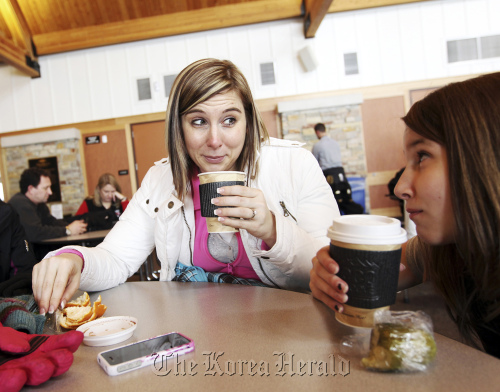For Jennifer Emmert, it’s the best of both worlds. Emmert loves kids and spends tons of time with her six nieces and nephews, from outdoor activities to sleepovers at her place. The 30-year-old is engaged to be married, but she’s perfectly happy living up to the name of one of her favorite books: “Childless and Loving It.”
“I’m completely content with adoring and smothering my nieces and nephews and keeping my life the way it is,” said the Minneapolis resident. “I absolutely love and adore them, and I love and adore when they go home.”
Emmert and millions of other Panks (professional aunt, no kids) are opting not to have kids, finding fulfillment in bonding with their nieces and nephews instead. Their numbers are growing: Nearly 20 percent of American women reach 40 to 44 childless, compared with 10 percent in the 1970s, said a 2008 Pew Research Center report.
Choosing not to have children doesn’t mean a woman has no use for children. As aunts they can forge loving relationships with nieces and nephews ― whether in the role of friend, mentor or sounding board ― and strengthen ties with their siblings.
The activities that aunts share with their young relatives vary widely and evolve as the kids grow up.
Sara Fleetham, 44, of St. Paul, Minnesota, has two “sets” of nieces and nephews, five of whom are now 22 to 26. When they were growing up, she said, “my sister had NO desire to take them to the State Fair. And I thought ‘How can you not take them to the State Fair?’ So I did that until she was ready to. Same with the Harry Potter movies.”
 |
Jen Emmett, having hot chocolate with niece, Kenzie Wolff (right) in Maple Grove, Minnesota, finds the acronym PANK (Professional Aunt, No Kids) applies to her. (Minneapolis Star Tribune/MCT) |
Her two other nieces, now 9 and 11, live in St. Michael, Minnesota. They spend one night a month with her, and Fleetham drives to their town for games and student of the month luncheons. “The oldest and I are Twins fans so we always go to a Twins game for her birthday. It never gets old. I love it.”
The number of childless women has been growing for years. A 2011 Center for Work-Life Policy study found that 43 percent of 33- to 46-year-old women have decided to put off having kids or have none at all. Among the factors fueling the trend:
― More young women than ever have lucrative careers that can get sidetracked by pregnancy and motherhood. Childless women ages 22 to 30 had bigger paychecks than their male counterparts in 47 of the nation’s 50 largest cities, according to Reach Advisors research.
― Marriage rates are at historical lows. The number of married adults has dropped to 51 percent, the Pew Research Center reported last year, compared with 72 percent in 1960.
― Health concerns come into play. Amy Hoover of Minneapolis said she is a likely carrier of a congenital disease that runs in her family, and for many women, childbirth can be a risky physical process.
―And there’s less societal pressure. A 2011 MacArthur Research Network survey found that only half of U.S. consumers cite marriage and parenthood as required milestones of adulthood.
That suits Hoover just fine. “People assume that everybody wants children, and that’s not true,” she said. “I’ve grown extremely weary of the virtual pat on the head by ill-informed people saying, ‘Oh, you’ll change your mind, dear.’ But now that I’m 41 and divorced, I have thankfully moved beyond such ridiculous and thoughtless comments.”
The timing of this growing trend couldn’t be better, said family therapist Judy Hoy.
“If ever there were a time where kids could benefit from having attachments to other adults it’s right now. What an aunt provides is another adult who can offer wisdom and support and resources. ... It is a win-win-win.”
Some experts, however, see potential pitfalls in the expanding role of aunts. Arturo Sesma, assistant professor of psychology at St. Catherine’s University, said it’s important that parents and aunts reach a consensus on their distinct roles.
“Parents and aunts should be on the same page. There should be consistency of message on discipline,” Sesma said. “It requires great communication between the parents and the sister.” Potential problems also can arise “if the parent is not a good parent and the aunt mirrors that and exacerbates that,” he said.
Still, Sesma noted, reams of research reinforce the benefits of kids having positive relationships with non-parental adults.
“It’s well established both in clinical practice and research,” he said. “Kids are likely to do better in school, be more socially adjusted. It’s an important developmental experience for kids. Having non-parental adults is a resource that kids gobble up.”
By Bill Ward
(Star Tribune )
(Distributed by MCT Information Services)








![[Today’s K-pop] Blackpink’s Jennie, Lisa invited to Coachella as solo acts](http://res.heraldm.com/phpwas/restmb_idxmake.php?idx=644&simg=/content/image/2024/11/21/20241121050099_0.jpg)